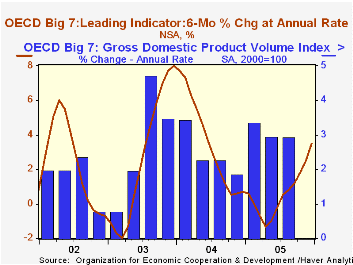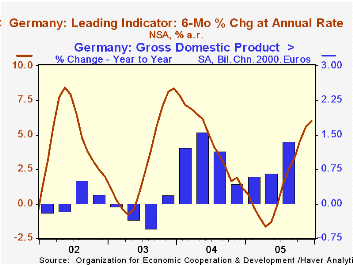 Global| Feb 13 2006
Global| Feb 13 2006OECD Leaders Rose Further
by:Tom Moeller
|in:Economy in Brief
Summary
During December, the Leading Index of the Major 7 OECD economies capped a year of slower growth for the full year of 2005, but improvement in the second half. In fact, a 0.6% December rise pulled the average monthly gain during 2H '05 [...]

During December, the Leading Index of the Major 7 OECD economies capped a year of slower growth for the full year of 2005, but improvement in the second half. In fact, a 0.6% December rise pulled the average monthly gain during 2H '05 to 0.4%, the best since early 2004, and lifted the leaders' six month annual growth rate to 3.5%.
During the last ten years there has been a 66% correlation between the change in the leading index and the q/q change in the GDP Volume Index for the Big Seven countries in the OECD.
Japan's leading index showed marked improvement as the year progressed and logged a 0.5% increase in December, the strongest since in over two years. It raised the six month growth rate to 2.4% though earlier growth rates were revised lower. The leaders' correlation with real economic growth in Japan has been a meaningful 40% during the last ten years.
The U.S. leaders posted a 0.9% rise during December that was the firmest since late 2003. It raised the leaders' six month growth to 4.3%, up sharply from the negative growth rates logged early in 2005. The correlation between the leaders' growth rate and real GDP growth has been a high 73% during the last ten years.
Leaders in the European Union (15 countries) continued on the moderate growth path in place since June and rose 0.3%. The rise raised the six month growth rate to 3.4%, the best since June '04. During the last ten years there has been a 59% correlation between the change in the leading index and the quarterly change in the GDP volume index for the European Union.
TheGerman leading index increased 0.5% for the eighth consecutive monthly increase. As a result the six month growth rate increased to 6.0%, the best since early 2004.
The 0.3% December gains in the French leaders was the slowest since June but the six month growth rate nevertheless rose to 4.4%, the best since mid-2004. To the downside, the Italian leading index fell for the third straight month and the 0.1% decline lowered the six month growth to a negative 1.3%.
The UK leaders were unchanged for the second month but the six month growth rate picked up to a positive 0.4%, off the negative lows of early 2005.
The Canadian leaders improved sharply for the second month with a 1.5% increase that followed an upwardly revised 0.9% spurt during November. The six month growth jumped, as a result, to 4.2%, its most promising since early 2004 The correlation of the leaders' growth with Canadian real GDP has been 49% during the last ten years.
The latest OECD Leading Indicator report is available here.
| OECD | Dec | Nov | Y/Y | 2005 | 2004 | 2003 |
|---|---|---|---|---|---|---|
| Composite Leading Index | 104.53 | 103.89 | 1.8% | 102.77 | 102.37 | 97.87 |
| 6 Month Growth Rate | 3.5% | 2.5% | 0.6% | 3.5% | 2.7% |
Tom Moeller
AuthorMore in Author Profile »Prior to joining Haver Analytics in 2000, Mr. Moeller worked as the Economist at Chancellor Capital Management from 1985 to 1999. There, he developed comprehensive economic forecasts and interpreted economic data for equity and fixed income portfolio managers. Also at Chancellor, Mr. Moeller worked as an equity analyst and was responsible for researching and rating companies in the economically sensitive automobile and housing industries for investment in Chancellor’s equity portfolio. Prior to joining Chancellor, Mr. Moeller was an Economist at Citibank from 1979 to 1984. He also analyzed pricing behavior in the metals industry for the Council on Wage and Price Stability in Washington, D.C. In 1999, Mr. Moeller received the award for most accurate forecast from the Forecasters' Club of New York. From 1990 to 1992 he was President of the New York Association for Business Economists. Mr. Moeller earned an M.B.A. in Finance from Fordham University, where he graduated in 1987. He holds a Bachelor of Arts in Economics from George Washington University.
More Economy in Brief
 Global| Feb 05 2026
Global| Feb 05 2026Charts of the Week: Balanced Policy, Resilient Data and AI Narratives
by:Andrew Cates






